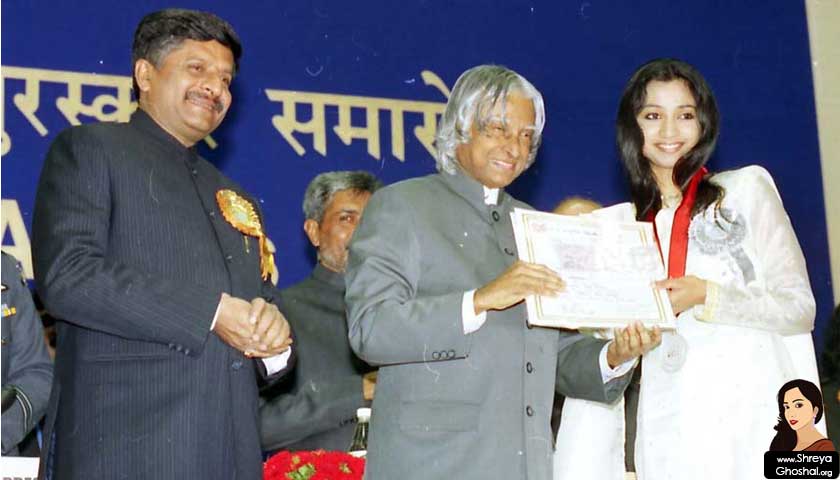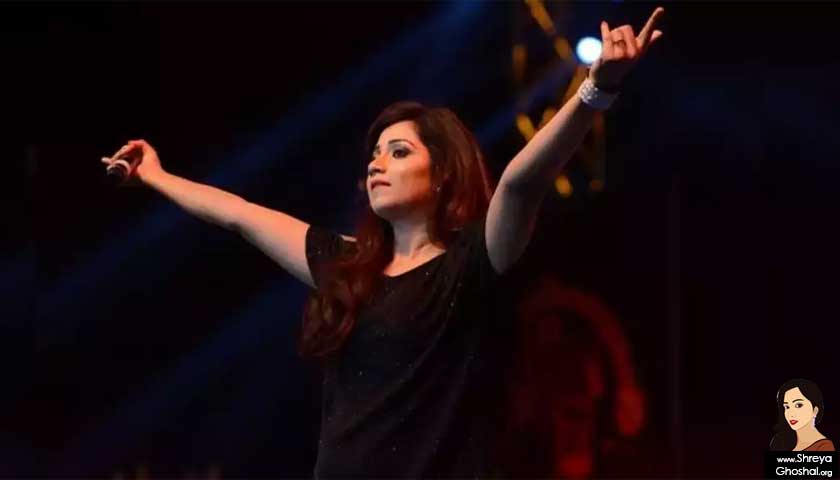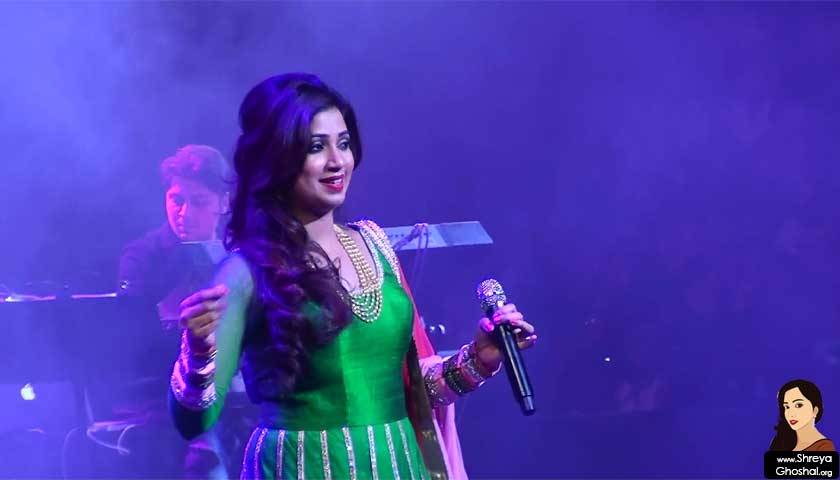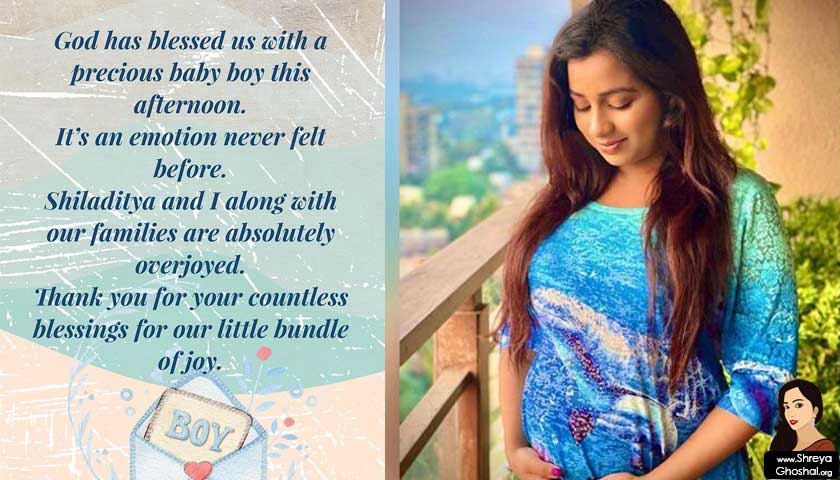Her first ever recorded song was “Ganraj Rangi Nachato” which is a cover version of a Marathi song originally sung by Lata Mangeshkar. Her first studio album was Bendhechhi Beena, which was released on 1 January 1998, with 14 tracks. Some of her earlier albums are O Tota Pakhi Re, Ekti Katha (1999), and Mukhor Porag (2000). Ghoshal recorded Bengali studio album Rupasi Raate (2002). Ghoshal recorded devotional songs in albums like Banomali Re (2002), and later, Krishna Bina Ache Ke (2007).
Shreya Ghoshal career, Bollywood debut (2002–04)
I remember I was asked to rehearse the song once before finally recording it. I simply closed my eyes and sang without a break. When I opened my eyes, I noticed a lot of excitement and chaos outside the recording room. Then Sanjayji told me I had sung the song so well that they had recorded it at one go.
— Ghoshal sharing her experience of recording “Bairi Piya”
Ghoshal caught the attention of director Sanjay Leela Bhansali when she participated in the 75th children’s special episode of Sa Re Ga Ma. Bhansali’s mother was watching the show and during Ghoshal’s performance, she called him to watch her performance, after which he decided to give her a chance in his next film. According to Bhansali, Ghoshal’s voice had the innocence needed for the character of Paro in Devdas (2002).
In 2000, Bhansali and music director Ismail Darbar offered her the opportunity to be the voice of Paro, the lead female character of Devdas, who was portrayed by Aishwarya Rai. Ghoshal sang five songs in the film, namely, “Silsila Ye Chaahat Ka”, “Bairi Piya”, “Chalak Chalak”, “Morey Piya”, and “Dola Re Dola”, with established singers such as Kavita Krishnamurthy, Udit Narayan, Vinod Rathod, KK, and Jaspinder Narula. She was sixteen when she recorded the first song for the film, “Bairi Piya” with Udit Narayan. Her Higher Secondary Examinations were nearing that time and she would take her books and notebooks to the studio to study during downtime.
“Bairi Piya” was an instant success and topped the charts. The film garnered her first Filmfare Award for Best Female Playback Singer for “Dola Re” (shared with Kavita Krishnamurthy) and a National Film Award for Best Female Playback Singer for “Bairi Piya”. Her performance also won her the Filmfare RD Burman Award for New Music Talent.
She was an immediate success and was called by various regional film industries for recording songs in her voice. Ghoshal was next heard in Darbar-composed Desh Devi, where she performed three tracks for the film.
After rendering traditional semi-classical songs for her previous ventures, Ghoshal performed two seductive numbers for M. M. Kreem’s Jism, which prevented her from being stereotyped. According to Ghoshal, “Jaadu Hai Nasha Hai” and “Chalo Tumko Lekar Chale” from the film “made everyone look at (her) in a new light”, opening the doors to a “versatile image”. She was awarded with another Filmfare trophy for Best Female Playback Singer for the song “Jaadu Hai Nasha Hai”. She thereupon worked with Anu Malik, where she performed the female version of “Aye Meri Zindagi”, “Seena Pada” and “Aai Jo Teri Yaad”, along with the bhajan-styled “Har Taraf”. In addition to providing vocals for “Har Taraf”, Ghoshal also made her first on-screen appearance in Saaya, as the school girl singing the song. Apart from Inteha, Ghoshal provided vocals for Malik in two other films, Munna Bhai M.B.B.S. and LOC Kargil, where she recorded the song “Chann Chann” for the former and “Pyaar Bhara Geet” for the latter, along with Sonu Nigam. Besides, Ghoshal made her first collaboration with Shankar–Ehsaan–Loy by performing the female version of the song “Tu Hi Bata Zindagi”. Calling her singing “effortless” in the song, The Hindu mentioned that she was “able to impart the required emotions” for the song.
In 2004, Ghoshal contributed to the soundtrack album of Thoda Tum Badlo Thoda Hum by performing four tracks, which were labelled with an “average” tag by Joginder Tuteja from Bollywood Hungama. However, he was “impressed” with Ghoshal’s rendition from her songs in Khakee, where he affirmed that Ghoshal’s voice suits Aishwarya Rai to the “core” and she “lends credibility to the entire song” in “Wada Raha”. Besides, the two duets with Nigam; “Dil Dooba” and “Youn Hi Tum Mujhse”, were equally favored by music critics. Further complimenting her vocals in the song “Hum Tumko Nigahon Mein” and “Soniye” from Garv, Tuteja asserted that Ghoshal’s “vocals have started to suit the current breed of actresses better and better with each passing day”. Apart from Dil Bechara Pyaar Ka Maara, Ghoshal worked with Nikhil–Vinay in other projects, by recording “Betab Dil Hai” from Phir Milenge, and “Woh Ho Tum” from Muskaan.
During the time, Nadeem–Shravan composed Tumsa Nahin Dekha: A Love Story was considered to be the biggest album for Ghoshal, as she sang all the numbers with an exception of one song. She performed a wide variety of songs—from a jazzy number to soft romantic tunes—in the album. According to Ghoshal, the album allowed her to “experiment with the entire range” of her “singing capabilities”. Besides, Ghoshal lent her voice for Malik, where she sang “Tumhe Jo Maine Dekha” and “Gori Gori” for Main Hoon Na apart from the title track. Mid Day affirmed that Ghoshal provided “perfect accompaniment” for the track, while Rediff.com was “impressed with her rendition”. The year marks her first collaboration with Rajesh Roshan and Daboo Malik by singing the melodious track for the former composed “Saansein Ghulne Lagi” from Aetbaar and performing the track “Shikdum” from Dhoom, for the latter.




